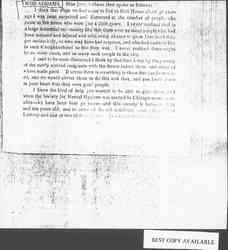MISS ADDAMS. Miss Jane Addams then spoke as follows:
I think that when we first came to live to Hull House about 30 years ago I was most surprised and distressed at the number of people who came to the house who were just a little queer. I never realized that in a large industrial community like this there were so many people who had been maimed and injured and with every chance to grow blue until they got melancholy, or who may have had reverses, and who had come to live in such a neighborhood as this then was. I never realized there might be so many cases, and so many such people in the city.
I used to be more distressed I think by that than I was by the poverty of the newly arrived emigrants with the future before them, and many of whom made good. It seems there is something in them that can be reached, and we would advise them to do this and that, and you knew down in your heart that they were good people.
I know the kind of help you wanted to be able to give them, and when the Society for Mental Hygiene was started in Chicago many years after -- we have been here 30 years -- and this society is between eight and ten years old, and to some of the old residents, among them Miss Lathrop and one or two of the rest of us who were on the first [Board] [illegible] [page 2] that nothing was going to do so much for the neighborhood as this society. Whether the office was here or [downtown], we were already glad to send people to them, and they were always glad to help them, and when these occupational features were added, -- just as many years ago the school of civics had a summer course for what we called attendants in those days, but they developed into nurses in the hospitals for the insane, -- and they made the different courses. It seems to me it was the dawning of a new age almost for the people who had fallen by the way, seeing that they could be reached with this wonderful care, and may be made to come back again to some sort of self expression, and to some conviction that they were of use in the world. That, of course, is a great achievement and that is what progressive philanthropy does. It begins with the people who are conversant with grief, and then it goes on to the men and women with the needs, and we try to find out what the situation is and what we can do to minister to it.
In many ways this is one of the last words which philanthropy has endeavored to achieve. This ministry to them through their own occupation, and through the processes of mind and soul stimulate self-respect and self-expression.
I am almost of the same mind with what the first speaker said, and another thing is true, so many times in education: You recall that occupational therapy puts the stress not upon the work but upon the worker. Now that is exactly what the significance is in regard to modern industry, the emphasis is put on the work, and the worker is taught to take care of himself and to go to the office or the workshop, as the situation may be.
We are living in an age of great changes in every industry. There is an undivided interest in the producer, and is quite possible that these experiments which will take place in occupational therapy will take place even more so than in vocational training, and will point the way for some of the changes which are to come later.
You know that the manual training in our schools was the first stepping stone in vocational training, and it had its start because people tried to teach what they called then the "feeble minded children." Some of the best vocational experiments began at the bottom. That is the way we found the people needed so much, and the teacher was put on his mettle and forced into new fields, and it is possible you have in evidence here an experience which is world wide, and which will keep you occupied with the whole situation, as to the development of the men whom you are trying to restore; not merely trying to educate, but to give them a place in society.
I want to congratulate you first, because you are really the vanguard on the line of philanthropic effort, and secondly, I want you to be congratulated for experimenting in the things which society so sadly needs at the present moment, and which you are trying to do today so well and [page 3] so completely, making for the best experiments, and you are beginning at the bottom as all great social, industrial experiments have [always done].
I am so happy that Hull House can house you for the few moments that these fine men and women will be together. It has been a great pleasure to us that Favill School has been with us these three years. Now that the war is over they are going to have a finer house, and we are going back to our Italian boys, but the relationship has been very pleasant and cordial, and I thank you for coming here and all of you for choosing this place for your Convention.














Comments